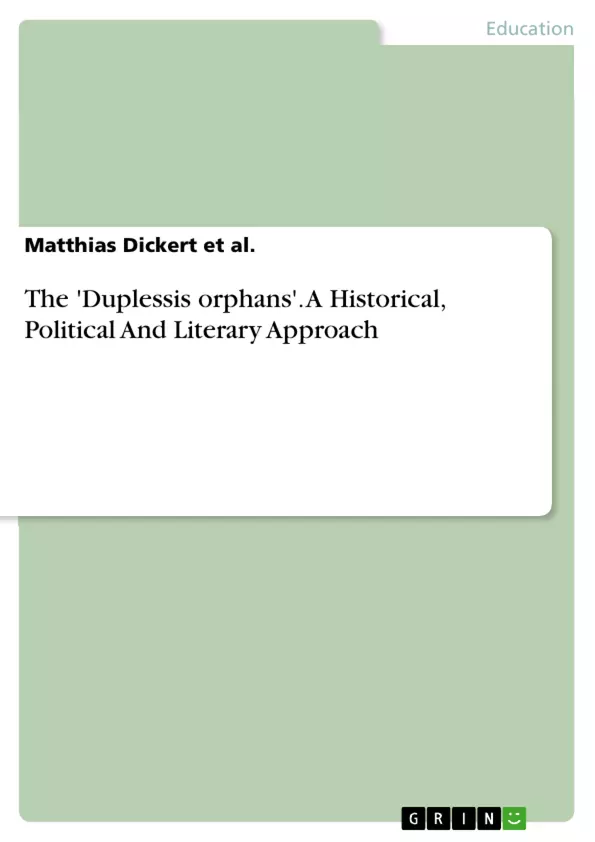The manifold topics related to what is commonly known as the catchphrase ‘Duplessis orphans’ have shocked (and still do shock) many Canadians. Fact is that scientists of different research fields talk about a dark spot of contemporary Canadian history, which until today has left many questions unanswered.
To tackle the subject of physical, mental and sexual abuse, along with students, at a German modern secondary school and to present the finding at university first seemed to be a difficult task to master. However, the present discussion of sexual abuse of children and teenagers in church-run institutions in Ireland or Germany hint at the importance of this matter. German students have already encountered this problem in connection with Australia, where ‘The Stolen Generation’ is a matter in form 9.
In order to give an objective (but critical) reflection of this topic, an interdisciplinary approach seems advisable, since we regard a problem which originates in many different backgrounds. Students can thus use historical, sociological, religious and psychological information to better understand the practice of child abuse in the widest sense.
The topic is also close to the students’ own life experience, and an in-depth analysis of the Canadian example enables them to work on a specific example with the possibility to better understand this complex matter.
The Canadian background which geographically centers around the Quebec area also teaches them a lot about Canada and helps them see how closely related the Duplessis orphans are to Canada’s past and present.
The shocking fact that child abuse has been tolerated for such a long time also shows that Canada – like all former colonies of France and Great Britain – has been a victim of colonization that exercised the so-called ‘four Cs’ (conquest, civilization, commerce and, above all, Christianity) to deal with their colonies.
Table of Contents
- Foreword
- Abstract
Objectives and Key Themes
The main objective of this work is to provide an interdisciplinary analysis of the "Duplessis Orphans" scandal in Canada, examining its historical, political, and literary dimensions. This exploration aims to understand the widespread issue of child abuse within a specific historical context, while also drawing connections to broader global concerns.
- Historical context of child abuse in Canada
- The political role and responsibility in the Duplessis Orphans scandal
- The lasting impact of the scandal on Canadian society
- Literary representations of orphans and child abuse
- Comparative analysis with similar scandals worldwide
Chapter Summaries
Foreword: This section details the collaboration between the Marburg Center for Canadian Studies and a Hessian school, highlighting the project's aim to bridge the gap between university and secondary education through the lens of Canadian literature. It expresses gratitude for the opportunity to present research on the "Duplessis Orphans" to a wider audience and emphasizes the importance of addressing child abuse.
Abstract: The abstract introduces the "Duplessis Orphans" as a significant and disturbing aspect of Canadian history, characterized by widespread physical, mental, and sexual abuse. It emphasizes the interdisciplinary nature of the study, drawing on historical, sociological, religious, and psychological perspectives to understand the issue. The abstract also highlights the relevance of the topic to students' own lives and its connection to broader patterns of child abuse globally, linking it to similar events in other countries and contextualizing it within the historical framework of colonization.
Keywords
Duplessis Orphans, child abuse, Canadian history, political scandal, Catholic Church, interdisciplinary approach, orphan narratives in literature, colonization, comparative analysis, social welfare, Maurice Duplessis, Union Nationale.
Frequently Asked Questions: A Comprehensive Language Preview
What is the main topic of this text?
This text provides a comprehensive preview of a work analyzing the "Duplessis Orphans" scandal in Canada. It examines the scandal from historical, political, and literary perspectives, aiming to understand the widespread child abuse within its context and connect it to broader global concerns.
What are the objectives and key themes explored?
The main objective is an interdisciplinary analysis of the Duplessis Orphans scandal. Key themes include the historical context of child abuse in Canada, the political role in the scandal, its lasting impact on Canadian society, literary representations of orphans and abuse, and a comparative analysis with similar global scandals.
What is included in the Table of Contents?
The table of contents includes a Foreword and an Abstract.
What is the focus of the Foreword?
The Foreword details the collaboration between the Marburg Center for Canadian Studies and a Hessian school, emphasizing the project's aim to bridge the gap between university and secondary education through Canadian literature. It also highlights the importance of addressing child abuse.
What does the Abstract cover?
The Abstract introduces the "Duplessis Orphans" scandal as a significant historical event involving widespread abuse. It emphasizes the interdisciplinary approach of the study, using historical, sociological, religious, and psychological perspectives. It highlights the topic's relevance to students and connects it to global patterns of child abuse.
What are the key chapters summarized?
The provided preview summarizes the Foreword and the Abstract.
What are the keywords associated with this text?
Keywords include: Duplessis Orphans, child abuse, Canadian history, political scandal, Catholic Church, interdisciplinary approach, orphan narratives in literature, colonization, comparative analysis, social welfare, Maurice Duplessis, Union Nationale.
What type of audience is this preview intended for?
The preview is designed to provide a comprehensive overview, likely for students and researchers interested in Canadian history, social issues, and literature. The collaboration mentioned in the Foreword suggests an interest in making this research accessible to a wider audience, beyond just university scholars.
What is the overall purpose of this preview?
The purpose is to offer a concise yet informative overview of the upcoming work, highlighting its key arguments, methodologies, and findings, thus encouraging further engagement with the topic.
- Citation du texte
- Matthias Dickert et al. (Auteur), 2015, The 'Duplessis orphans'. A Historical, Political And Literary Approach, Munich, GRIN Verlag, https://www.grin.com/document/295313



